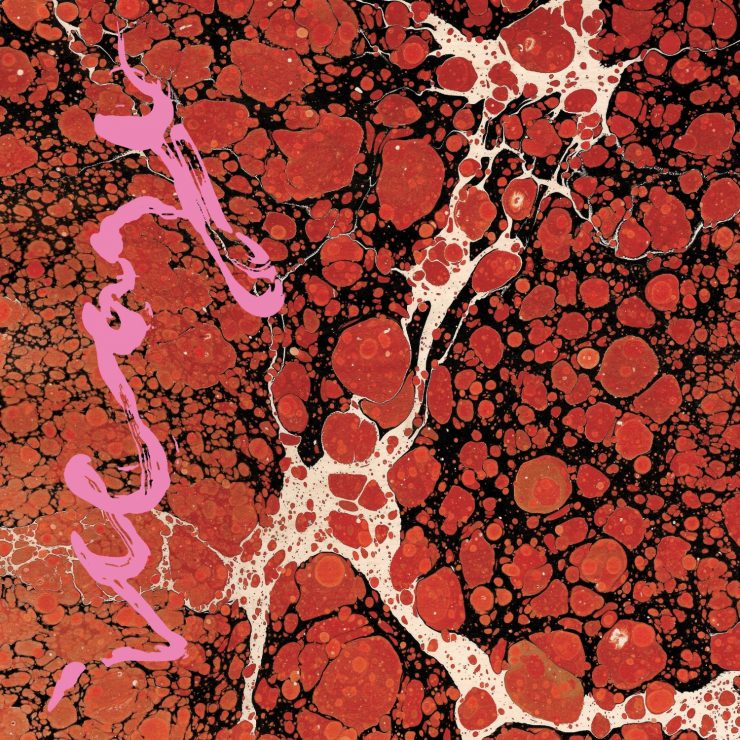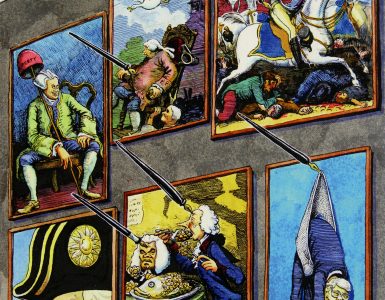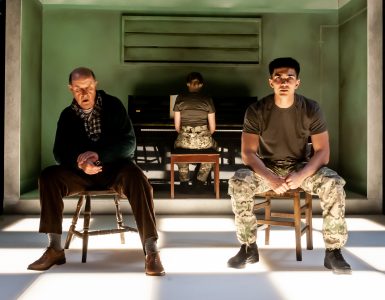8.5/10
Iceage’s debut album New Brigade (2011) was something special – a spare, bracing post-punk assault commanded by four Danish teenagers that was high on energy and low on pretence. You’re Nothing (2013) finessed the formula, but Plowing Into The Field of Love (2014) was wholly different, with a stylistic shift that took them over the porous border from punk into rock. Now singer Elias Bender Rønnenfelt’s job wasn’t to sneer and spit nihilisms over the bone-breaking cacophony created by his bandmates, but rather it was their job to provide settings for the wild and poetic lyrics he was singing in his distinctive slurred style. Beyondless follows this trajectory further, having a sound that is a loose and decadent rock and roll, velvet and leather, sunlight and scum, the Stooges meets Serge Gainsbourg. Rønnenfelt is Rimbaudesque, a doe-eyed enfant terrible spouting poetic philosophy from the gutter. Each song is about war or God or love or life itself, and his primary reaction to all is one of disgust – in an act of petulant protest, Iceage luxuriate in the filth.
It begins well with the exhilarating opener ‘Hurrah’, whose scintillatingly ultra-violent chorus “We can’t stop killing, and we’ll never stop killing, and we shouldn’t stop killing, hurrah!” takes an ironic stab at the tradition of decorating acts of violence with pomp and circumstance rather than viewing our predilection for them as a regrettable flaw of the human condition. This is followed by the excellent lead single ‘Pain Killer’, where Rønnenfelt’s persona is that of a junkie, addicted to the “strange divine” of love, or lust. Sky Ferreira cameos as the lover who has got Ronnenfelt hooked, without whom life is a “bane”, but with whom life is numb.
Musically, these tracks are similar, and showcase one of the intriguing sounds Iceage deploy on Beyondless. They have the dirt of The Stooges, the dirge of My Bloody Valentine on tracks like ‘You Made Me Realise’, but the open and wide profile of Wall-of-Sound studio rock. There are guitars, bass, drums, tambourines, and pianos, but these all crowd round the same space, as if one mass with multiple projections. About half the tracks have this sound, but elsewhere there is more experimentation, incorporating the decadent balladry of Serge Gainsbourg to create something slower and softer, as well as flirting with rockabilly. Many songs feature horns and violins, and these lend an air of deluded grandeur and demented revelry, as if celebrating some deranged ritual. But by far the strangest component of their sound is Rønnenfelt’s disorderly voice, with his Danish accent and laissez-faire articulation leading to artfully mangled vowels and sense of drunken volatility.
There is a malleability to the tempo too, but this doesn’t come off as amateurish, because all the instruments move as one. This gives the sound an organic quality that is enhanced by the imperfections and variation in the guitar tones, the bending pitches, the squeals of feedback, the white-noise of the open hi-hats and the sympathetic rustle of the snare. Like the red blood cells pictured on the cover, the sound is one of a cohesive, co-ordinated system emerging from messy, independent constituents. And like the idea of blood, it’s still somewhat disgusting – it sounds dirty, as if covered in algal scum. There are no clean tones or sharp edges here, these figures are imperfect, fuzzy, mould-covered.
This is the band’s disgust at the world infecting their sound – on ‘Under The Sun’ Rønnenfelt even sings “I shall wallow in the mire”. ‘Under The Sun’ imagines an incompetent God in need of a saviour, ‘Plead The Fifth’ finds humans “complacent with the faults in our blazing stars”, and ‘Take It All’ goes so far as to declare “every single last one of you is a criminal”. But Rønnenfelt’s disdain isn’t just pointed outwards, but also inward. On ‘The Day the Music Dies’ he discusses performing an exorcism on himself. He has something of a reputation for being a difficult person – “A cheerless weekend with rock’s most difficult frontman” is how The Fader describe their experience with Rønnenfelt. ‘Thieves Like Us’ seems to be a self-critique, with Ronnenfelt saying he has “the brains of a blow-up doll”, and wanting to “file a restraining order, on humanity or myself”. He also seems to take the piss out of his whole approach on Beyondless – “hush as I spill my wayward theories”. It’s true that Rønnenfelt’s proclamations on the state of the world aren’t always novel or beautifully-expressed, sometimes seeming like ideas from a first-year philosophy essay, especially his reference to “dying for the death of the West” on ‘Take It All’. But as a frontman he remains compelling, partly for his delivery but also for his courage in trying to tackle big themes. His vocabulary is also constantly attention-grabbing, with words that you’d rarely find in the mouth of any other singer, let alone someone who’s singing in their second language, like arrogate, evanescent, postulate, paradigm, lucent, and boondocks.
One of the most interesting songs is ‘Showtime’. It sets a powerful emotional scene with contemplative guitars, lamenting horns, and a simple bass groove. Rønnenfelt’s lyrics tell the story of a crowd excitedly gathering in a theatre for an acclaimed show. As the curtain is raised, the music descends into bawdy cabaret style, complete with a knee-bending horn section. And when the fêted star of the show arrives, there is a surprise – “In the roaring applause, a pistol he draws / And blows his brains all over the stage”. Such nihilism and absurdity in a theatrical setting references Samuel Beckett, whose bizarre Nohow On provides the titular neologism ‘Beyondless’. What’s interesting on this song is that Iceage choose to deface a great song with that bizarre cabaret section, which no-one could earnestly enjoy in the 21st century, for the sake of telling a story. This demonstrates how different a band Iceage have become since their early days – now it’s all about what Rønnenfelt is saying, not the riffs and the attitude.
The song ‘Beyondless’ itself is a suitable closer, returning to the pulverizing style of the opening duo. There is also a resolution lyrically, with Rønnenfelt contemplating “to stray to the backwoods and boondocks”, but ultimately deciding to be a “vagrant in the throes of this city”, which seems to recall the poverty-enforced peripateticism of Knut Hamsun, the Norwegian author who wrote the acclaimed semi-autobiographical novel Hunger. Rønnenfelt seems to think there is nobility and artistry in this state of squalor, following a long tradition of writers, artists, and musicians who lived through it and romanticised it. But more than that, Rønnenfelt casts the world’s natural state as one of fetid squalor and hypocrisy. Yet the world we live in is beyondless – there is nothing else – and so Iceage’s response is to meet it as it is, and find glory in the dirt.














